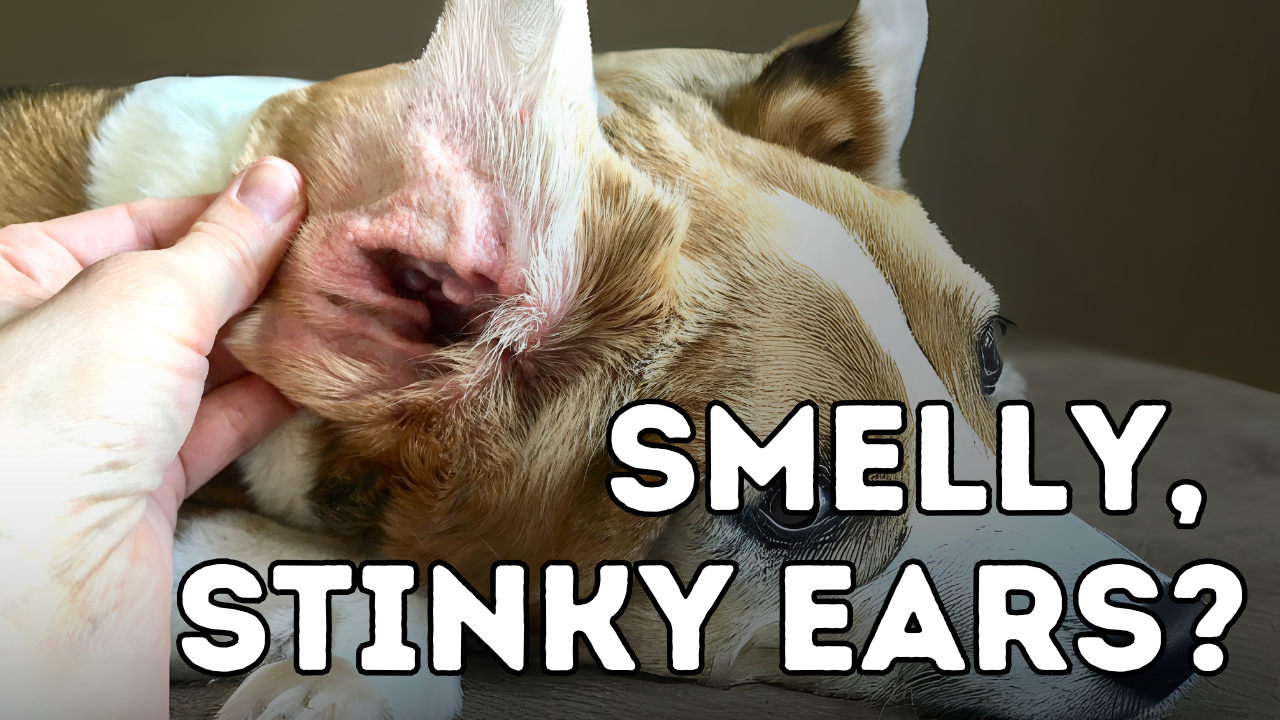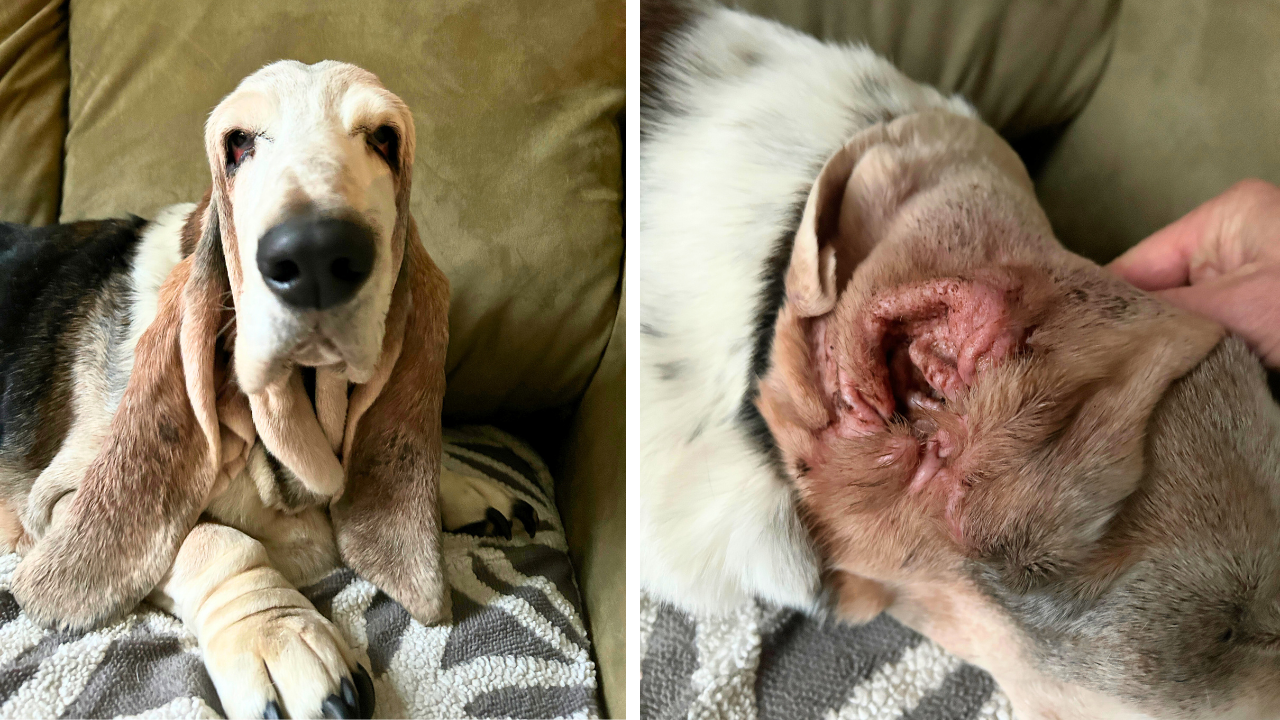Smelly, stinky ears? | How to Treat Smelly Ears and Prevent Ear Infections in Pets

Visiting Family with Amazing Dogs, But One Has a Chronic Issue
I’m currently visiting family who have some amazing dogs. However, one of the older dogs, Beatrice, a Basset, has a chronic ear infection and carries a bit of a “doggy” smell.
Beatrice’s Struggle: Yeast Infections and Allergies
Beatrice suffers from a yeast ear infection, along with yeast and bacteria buildup in some of her skin folds. These issues are secondary to an underlying allergy. The key to helping her is treating that underlying allergy and the inflammation it causes, as this is what contributes to the constant scratching and recurring infections.
Addressing the Root Cause: Natural Antihistamines
One of the most effective ways to address these symptoms is through a natural antihistamine. For this, I highly recommend Quercetin. It’s a holistic option that can provide relief and help stop the cycle of irritation and infections.
Quercetin: The Holistic Solution for Itchy Dogs
We’ve seen great success with our Quercetin supplement, and it’s been incredibly popular with pet owners. Many itchy dogs have found relief with this natural solution, and I’m confident Beatrice will benefit as well.
Dr. Jones’ ULTIMATE Bioactive Quercetin
If you’re looking for a natural way to help your dog with allergies and chronic itching, our Quercetin supplement is here to help. It’s designed to support your pet’s health and reduce inflammation.
Check it out here:
Dr. Jones’ ULTIMATE Bioactive Quercetin


Allergy-Induced Ear Infections in Dogs: Understanding, Treating, and Preventing Recurring Issues
As a veterinarian, I see many dogs suffering from allergy-induced ear infections, which can be painful and persistent. These infections, often linked to allergic reactions, tend to recur and can lead to chronic issues if not addressed properly. In this article, I’ll explain the underlying causes of allergy-induced ear infections, the common symptoms to watch out for, and how to treat and prevent these infections naturally.
What Causes Allergy-Induced Ear Infections?
Allergy-induced ear infections in dogs are most often triggered by allergies to fleas, foods, or environmental factors like molds, pollen, and dander. These allergies can cause the skin barrier to break down and lead to excessive wax production in the ear canal. As a result, the normal yeast and bacteria that live in the ear canal proliferate, causing inflammation, pain, and discharge.
Dogs with seasonal allergies often experience ear infections during specific seasons, while those with food allergies or non-seasonal environmental allergies may struggle with recurrent ear infections year-round. Over time, chronic inflammation can cause scarring or calcification in the ear canal, which reduces the ear’s opening and makes treatment more difficult.
Symptoms of Allergy-Induced Ear Infections
The symptoms of allergic otitis (ear infection due to allergies) are very similar to those of otitis externa, and they tend to worsen during allergy seasons or appear year-round.
Here are some signs to watch for:
- Shaking the head or scratching at the ears
- Redness in the ear flap or at the entrance to the ear canal
- Discharge from the ear canal
- Pain when the ear is touched
- Thickening of the ear canal
- Rubbing the face or ear on the ground or furniture
- Excessive licking of the paws (a general sign of an allergy)
- Itching or licking other parts of the body
- In severe cases, if the eardrum ruptures, the infection can spread to the middle and inner ear, causing symptoms like head tilting, walking abnormally, circling, falling over, or pain when eating or opening the mouth.
Treating and Preventing the Underlying Allergy
To effectively manage ear infections, we must treat the underlying allergy. Here are some steps I recommend:
Food Allergy: A Common Culprit
Food allergies affect up to 15% of dogs. The most common allergens are chicken, beef, dairy, egg, and for cats, fish. While no diet is completely “hypoallergenic," hydrolyzed diets available through veterinarians are a good option. To determine if a food allergy is at play, I recommend a food trial with a simple protein like turkey, paired with a carbohydrate like brown rice and some vegetables like kale.
- Food Trial: Feed a simple recipe like 1/3 turkey, 1/3 brown rice, 1/3 kale, and a bit of sunflower oil for 8 weeks. Give 2 cups per 20 pounds of your dog’s body weight daily.
Atopic Dermatitis and Skin Absorption
Atopic dermatitis is the most common cause of recurring ear infections in dogs. What we once thought were primarily inhaled allergens are now believed to be absorbed through the skin, where they trigger an immune system response that leads to inflammation.
Natural Remedies for Allergies
There are several natural remedies that can help with allergies in dogs, and I’ve found these to be particularly useful:
- Bioflavonoids: Quercetin, a flavonoid found in fruits and vegetables, has been shown to help with allergies. I recommend 100 mg per 10 pounds of body weight daily.
- Antihistamines: Benadryl (diphenhydramine) is often effective. The standard dose is 1 mg per pound of body weight, 2-3 times daily. Consult your veterinarian before using this.
- Herbal Antihistamines: Nettle (1 teaspoon per 10 pounds daily) and Quercetin (50-100 mg per 10 pounds) can provide relief.
- Licorice Root: Acts as a natural steroid. I recommend ½ ml per 20 pounds twice daily. Use for a maximum of 14 days.
- Curcumin: Known for its anti-inflammatory properties. The recommended dose is 100 mg per 10 pounds daily.
- Honey for Allergies: Local, unpasteurized honey can act as a natural desensitization method. Use ½ teaspoon per 10 pounds daily for 8-12 weeks.
- Soy for Itching: Beta-sitosterol in soy can help reduce itching. The dose is 1-2 mg per pound, twice daily.
- Fatty Acids: Omega-3s from fish, flax, or krill oil are essential for managing allergies. I recommend Krill oil at 1000 mg per 50 pounds or Fish oil at 1000 mg per 10 pounds daily.
Treating Recurring Dog Ear Infections
If your dog has recurring ear infections, it’s crucial to treat both the underlying allergy and the infection itself. Here are some natural ways to address the infection:
- Apple Cider Vinegar (ACV): ACV is naturally antibacterial and antifungal. A simple solution of 80% ACV and 20% warm green tea can help. Apply 5-10 drops twice daily for 7-10 days.
- Sweet Almond Oil and Lavender Oil: When the ears are very inflamed, this combination can help soothe them. Mix 2 tablespoons of almond oil with 10 drops of lavender oil.
- Anti-Yeast Medications: Canesten or Monistat, which contain Clotrimazole, are effective for treating yeast infections in dogs. Apply twice daily for 7-10 days.
- New Anti-Yeast Ear Recipe: Mix 1 cup of green tea, 2 tablespoons of ACV, and 1 tablespoon of coconut oil. Ensure it’s at room temperature and that the coconut oil has melted. Use this as a flush to clean the ears, then apply 5 drops in each ear twice daily for 5 days as needed.
Healing Your Pet at Home
I recently treated Beatrice, a dog with recurring ear infections, by using a topical ear remedy and administering Quercetin daily. She’s doing much better, and as I type this, she’s curled up beside me, though still a bit smelly!
If your dog suffers from recurring ear infections, start simple. Use Canesten to treat yeast infections, and address the underlying allergy with natural supplements like Quercetin, Beta-sitosterol, and Krill oil.
P.S. If your dog has recurring ear infections, consider using Canesten to treat yeast infections and supporting the underlying allergy with supplements like Quercetin, Beta-sitosterol, and Krill oil. You can find my Ultimate BioActive Quercetin supplement, which is a powerful antioxidant with antihistamine, anti-inflammatory, and antiviral properties, on my website.
Dr. Jones’ New QUERCETIN Supplement: Available here for better allergy relief for your pets.
Quercetin: The Holistic Solution for Itchy Dogs
We’ve seen great success with our Quercetin supplement, and it’s been incredibly popular with pet owners. Many itchy dogs have found relief with this natural solution, and I’m confident Beatrice will benefit as well.
Dr. Jones’ ULTIMATE Bioactive Quercetin
If you’re looking for a natural way to help your dog with allergies and chronic itching, our Quercetin supplement is here to help. It’s designed to support your pet’s health and reduce inflammation.
Check it out here:
Dr. Jones’ ULTIMATE Bioactive Quercetin







I used your new Anti-yeast ear solution on my dog who has chronic ear/sinus issues because he is a Chug. Worked beautifully! Thank you for the recommendation.